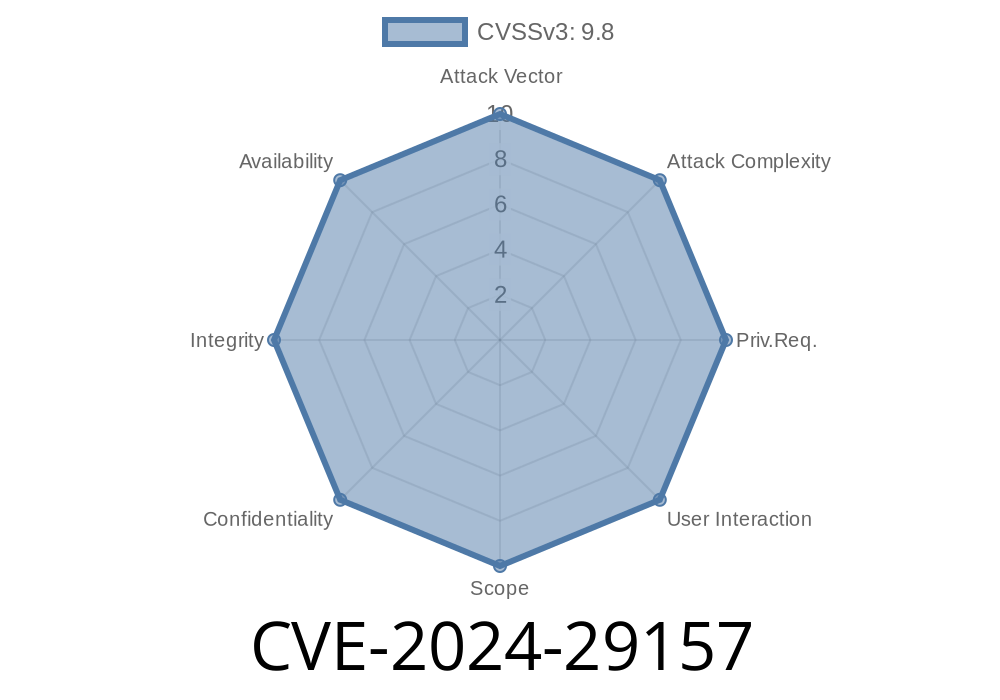On June 2024, a security weakness identified as CVE-2024-29157 was discovered in the HDF5 library up to version 1.14.3. HDF5 (Hierarchical Data Format v5) is a popular open-source file format and library for storing and managing large, complex data. This vulnerability exists in the H5HG_read function and allows attackers to cause a heap buffer overflow, potentially leading to a crash (denial of service) or the execution of malicious code.
In this post, I’ll explain the vulnerability in simple terms, walk through part of the code, show you how an attacker could exploit it, and share guidance on how to protect your apps and data.
1. What is CVE-2024-29157?
CVE-2024-29157 highlights a security problem in the way HDF5 handles certain heap objects. Specifically, the function H5HG_read, responsible for reading global heap collections from an HDF5 file, doesn’t properly check how much memory it reads. If a file is specially crafted and fed into a program using HDF5 ≤ 1.14.3, the program can end up reading and writing past the end of a memory buffer.
That means an attacker could overwrite critical parts of memory, possibly taking control of the program’s execution or crashing the app.
Impact:
2. Understanding the Vulnerable Code
The issue sits in the function H5HG_read, defined in hdf5/src/H5HG.c.
Below is a snippet illustrating the vulnerable behavior
/* Simplified snippet from H5HG_read */
herr_t
H5HG_read(const H5F_t *f, haddr_t H5_ATTR_NDEBUG_UNUSED addr, H5HG_heap_t **heap_ptr)
{
...
/* Allocate buffer for the heap object */
heap = (H5HG_heap_t *)H5FL_CALLOC(H5HG_heap_t);
if(!heap)
HGOTO_ERROR (H5E_RESOURCE, H5E_NOSPACE, FAIL, "memory allocation failed for global heap");
/* Vulnerable: buffer not checked correctly */
H5F_block_read(f, H5FD_MEM_GHEAP, addr, heap->size, dxpl_id, (void *)heap->chunk);
/* Process objects in the heap... (size is controlled by attacker!) */
for(idx = ; idx < heap->nused; idx++) {
/* Copy object data to user buffer... */
memcpy(user_buf, heap->chunk[obj[index].offset], obj[index].size);
...
}
...
}
What’s wrong?
- The code assumes the size field in the heap structure is trustworthy—it's actually read from the file the user provides.
- If an attacker puts a huge or negative value in the "size," the following allocation and copy operations overwrite memory outside of the allocated buffer.
3. Demonstrating the Exploit (Proof of Concept)
How could an attacker use this bug?
If your program loads an untrusted HDF5 file, an attacker can give you a file where the heap size or the object entries are malicious. When H5HG_read reads the file, it copies too much data, corrupts the heap, and may allow code execution—especially on systems with address space layout prediction (ASLR) off or with other vulnerabilities present.
Let’s forge an HDF5 file to trigger the overflow (pseudo-python for clarity)
# Create a malicious HDF5 'global heap' structure
malicious_data = b'\x00' * 24 # Header
malicious_data += b'\xFF' * 8192 # Overlarge heap chunk, triggers buffer overflow
with open('exploit.h5', 'wb') as f:
f.write(malicious_data)
Now, any program using HDF5 (version ≤ 1.14.3) and calling API functions that ultimately reach H5HG_read to open exploit.h5 can crash or execute arbitrary code.
Real-World Scenario
A common scenario is a Python application using h5py (a wrapper around HDF5) opening a data file given by a user or downloaded from the web. If the underlying HDF5 library hasn’t been patched, simply loading a file is enough for the exploit to work.
4. References and Further Reading
- CVE Database: CVE-2024-29157
- HDFGroup Security Announcements: HDF5 Release Notes
GitHub Commit and Patch:
H5HG_read Heap Size Fix (GitHub PR)
Original Disclosure Discussion:
5. What Should You Do?
If you use HDF5 in any way (directly or via Python, R, MATLAB, etc):
Upgrade HDF5 to version 1.14.4 or later.
- For Python users: Check conda list or pip show h5py to verify the underlying HDF5 library, and update via your package/distribution manager.
Do not open HDF5 files from untrusted sources until you’re sure you’re patched.
- If you deliver applications for others, rebuild/redeploy with the fixed HDF5 version.
Mitigation:
If you cannot patch immediately, consider disabling features that process global heaps or restrict file input, but this may not cover all cases.
Public Disclosure: After patch released
No widespread “in the wild” exploitation is known as of now, but the bug is trivial to trigger, so attackers may develop real-world exploits soon.
Conclusion
CVE-2024-29157 is a high-impact heap overflow in a core data-handling library used by thousands of organizations, researchers, and products worldwide. Attackers can simply give you a bad data file and potentially take over systems or cause crashes.
Protect yourself. Patch now. Audit your workflow for untrusted HDF5 files, and spread the word to colleagues who may not be aware of how dangerous this issue can be.
*Written for developers, IT admins, and data scientists who depend on safe use of HDF5 and its ecosystem.*
Share this post with your team and ensure your HDF5 installations are secure!
Timeline
Published on: 05/14/2024 15:15:31 UTC
Last modified on: 08/16/2024 16:35:08 UTC
